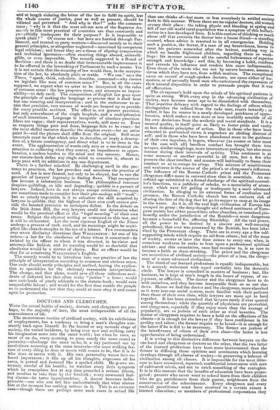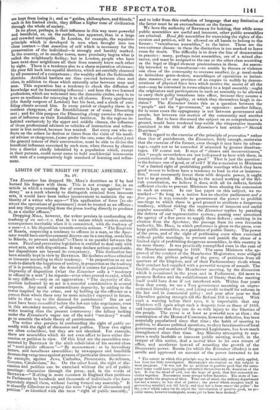DOCTORS AND CLERGYMEN.
Wrru the actual habits of society, doctors and clergymen are per- haps, to the majority of men, the most indispensable of all the conveniences of life.
The monotonous routine of civilized society, with its subdivision of employments, has a tendency to bring a man's thoughts con- stantly back upon himself. In the hunter or any nomade stage of society, the varied incidents, by being ever new and striking, carry his imagination more into the outer world ; but when he rises, as most of us do, every morning to pace nearly the same round as yesterday—discharge the same tasks, in a day portioned out by meal-times recurring at the same intervals—the most striking fea- ture of every thing he does or meets with comes to be, that it is lie who does or meets with it. His own personality waxes into co- lossal importance; it fills up all his thoughts, engrosses all his cares, is petted and fostered like a spoiled child. He grows ex- tremely careful of his health ; he watches every little symptom which he remembers has at any time preceded a serious illness, and resolves to take time by the forelock ; every unwonted feel- ing alarms—he turns hypochondriac. A doctor becomes indis- pensable—one who can tell him authoritatively that what alarms him at the moment has nothing serious in it. This is an extreme case—though there are perhaps more such cases in actual life
than one thinks of—but more or less everybody in settled society feels in this manner. Where there are no regular doctors, old women occupy their place : the taking physic and bleeding at spring and fall of our old-world rural population was a symptom of this halluci- nation in a less developed form. It is this custom of thinking so much about self that converts the doctor into a house friend—a standing counsel, whose advice is resorted to in all emergencies. Holding such a position, the doctor, if a man of any benevolence, learns to treat his patients somewhat after the lenient, soothing way in which we handle frightened children, regarding them as weak- lings : his manner assumes all the careful forbearance of superior strength and knowledge ; and this, by becoming a habit, confirms and extends his influence and renders him more indispensable. Even those of the trade who are not by nature humane, assume a virtue which they have not, from selfish motives. The exceptional cases on record of rough-spoken doctors, are cases either of hu- morists, or of naturally harsh men who caricatured the expression of their natural disposition in order to persuade people that it was all affectation.
The clergyman's hold upon the minds of his spiritual patients is quite as strong. With every step in the advancing civilization of society, men become more apt to be dissatisfied with themselves. That sensitive delicacy with regard to the feelings of others which distinguishes the refined from the rude man, reacts inwardly ; or rather, it has its source in a newly-developed quickness of appre- hension, which makes a man more or less morbidly sensible of all his own deviations from the esthetic and moral standards. It is a neutral quality, in itself quite as likely to foster pride and vanity as less dubious principles of action. But in those who have been educated in puritanical views, it engenders an abiding distrust of self; and in those who have been abandoned more to the guidance of their own impulses, it begets, whenever (as sooner or later must be the case with all) heedless conduct has brought them into scrapes, similar misgivings, more intermittent perhaps, but also more inteuse during their intervals of activity. This sentiment is at some moment or another powerful in all men, but a few who possess the clear intellect and master-will habitually to frame their conduct so as to escape its stings. This mixture of sensitiveness and weakness is the source of the priest's or clergyman's influence. The influence of the Roman Catholic priest and the Protestant clergyman differ more in outward show than in essentials. An un- refined age submitted to a formal discharge of the spiritual counsel- lor's functions, to a publicity of rebuke, to a materiality of atone- ment, which were felt galling or inadequate by a more advanced civilization. In clinging to its external forms of confession and penance, the Roman Catholic church has run eminent risk of sharing the fate of the dog that let go its supper to snap at its image in the water. As it is, all the real high civilization of Europe has escaped its grasp : the deep thought and refined sentiment of Euro- pean society has either passed into other churches, or remained pro- fessedly under the jurisdiction of the Romish—a more dangerous because a household foe, affecting friendship. All the real power, all the power to be desired by a sincere and well-meaning priesthood, that ever was possessed by the Romish, has been inhe- rited by the Protestant clergy. There are in every age a few self- supporting minds which require no aid from others ; but of the mass of society, sooner or later the time comes to every one, when, in conscious weakness he seeks to lean upon a professional spiritual adviser ; and this consolation, once had recourse to, is as sure to become a habit as dram-drinking. The priest and the clergyman are necessities of civilized society—the priest of a less, the clergy- man of a more advanced civilization.
The third of our learned professions is equally indispensable, but it is scarcely welcomed with equal cordiality into the domestic circle. The lawyer is consulted in matters of business ; but, like business, he is kept at arm's length in the hours of repose, of en- joyment, or affliction. The doctor and the clergyman have to do with ourselves, and they become inseparable from us as our sha- dows. Hence we find the doctor and the clergyman, more absorbed as it were into our social system, more familiar with their patients than those of their own class, while lawyers are more apt to herd together. It has been remarked that lawyers rarely if ever quarrel among themselves; while the quarrels of physicians are proverbial, and clergymen, especially if they enjoy more than the average of popularity, are as jealous of each other as rival beauties. The doctor or clergyman requires to have a hold on the affections of his clients—it is enough for the lawyer if they have confidence in his probity and talent ; the former require to be loved—it is enough for the latter if he is felt to be necessary. The former are jealous of the interference of others of their own class—the latter is less apprehensive of being undermined. It is owing to this distinctive difference between lawyers on the one hand and clergymen or doctors on the other, that the two latter of the learned professions have been more instrumental than the former in diffusing those opinions and sentiments which learning develops through all classes of society—in preserving a balance of civilization among all classes. It is impossible for the most illite- rate to have occasional, repeated, confidential intercourse with men of cultivated minds, and not to catch something of the contagion. It is in this manner that the benefits of education have been propa- gated: parents who never went to school learn from their children who do go, parishioners from their pastor, neighbours from the conversation of the schoolmaster. Every clergyman and every medical practitioner must have received to a certain extent a learned education ; as members of professional corporations they are kept from losing it; and as "guides, philosophers, and friends," each in his limited circle, they diffuse a higher tone of civilization through the whole of society. In no place, perhaps, is their influence in this way more powerful and beneficial, or, on the surface, less apparent, than in a large and crowded metropolis. In London, for example, the repulsive principle which is developed in men when brought into too close contact — that assertion of self which is necessary for the preservation of the individual—is strongly and harshly marked. In the country, or in smaller towns, mere proximity begets what is called the neighbourly feeling; but in London, people who have been next-door neighbours all their lives scarcely know each other by sight. There is a tendency also to a sharp separation ofclasses: the poor fall back into squalid districts, which are carefully shunned by all possessed of a competence ; the wealthy affect the fashionable districts. Artificial barriers are thus erected between class and class, in addition to those which naturally arise between man and man. This separation has a tendency to check the diffusion of knowledge and its humanizing influence : and here the two learned professions, which are welcomed into the domestic circles, step in to serve as mediums for conveying it to all classes. Every apothecary (the family surgeon of London) has his beat, and a circle of con- fiding clients around him. In every parish or chapelry there is a resident clergyman, of the Establishment or of some Dissenting sect ; and for this purpose the Dissenting clergy exercise the same sort of influence as their Established brethren. In the regions in- habited exclusively by the upper and middle classes, the influence of those professional advisers as vehicles of instruction and refine- ment is less noticed, because less wanted. But every one who re- flects on the solace he derives at times from the visits of his medi- cal adviser or clergyman, (some prefer the one, some the other,) and the general tenons of their conversation, must be able to divine the beneficial influence exercised by such men, when thrown by chance into a district chiefly inhabited by a population which, except in their persons, could never come to hold confidential intercourse with men of a comparatively high standard of learning and refine- ment.



























 Previous page
Previous page